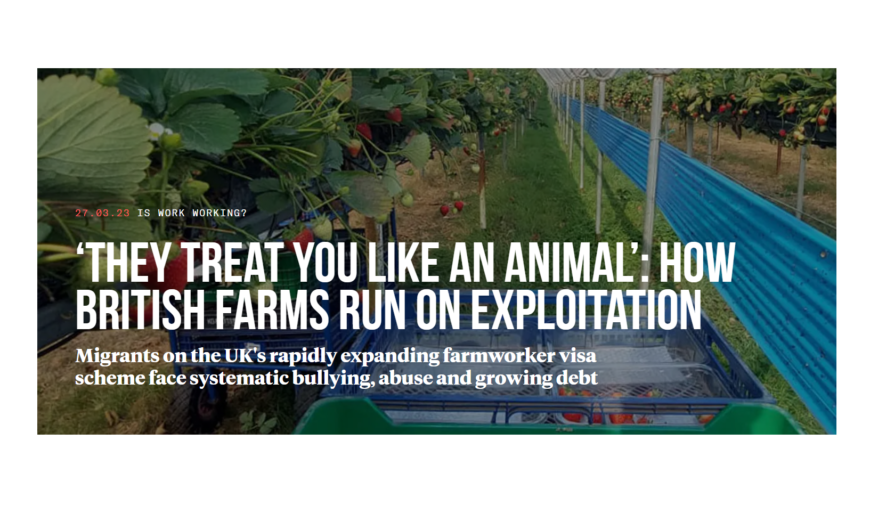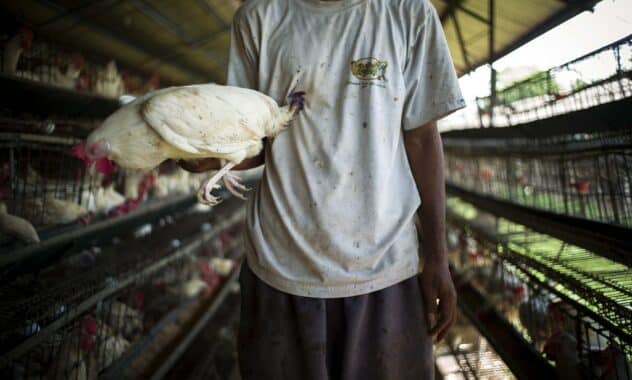‘They treat you like an animal’ – how British Farms run on exploitation
Report by the Bureau of Investigative Journalism (in three parts)

An investigation by the Bureau of Investigative Journalism and VICE World News has uncovered widespread mistreatment of migrants working at more than 20 UK farms, nurseries and packhouses in 2022. Workers reported a litany of problems, from not going to the toilet for fear of not hitting targets, to being made to work in gale-force winds. Some said they would be shouted at or punished for having their mobile in their pocket or talking to work colleagues while on the field. Others said they were threatened by recruiters with being deported or blacklisted.
Eight-seven-five. Angel still remembers her number, months after leaving the UK. The number assigned to her by the farm. The number used instead of her name when her supervisor ordered her to work faster or punished her.
Angel, a single mother from South Africa, said that she felt like a prisoner, being shouted at and undermined constantly, no matter how hard she worked. Her name and the real number she was called by have been changed to protect her identity.
“Even before we start work the supervisors would be screaming at us… they would treat you like an animal,” she said.
Read part one here
Migrant agricultural workers who travelled thousands of miles to plug labour gaps on UK farms have faced unlawful wage deductions, the Bureau of Investigative Journalism and VICE World News can reveal.
Research by TBIJ and VICE World News, along with case work data from the Work Rights Centre, found that more than 20 people working at nine farms across the UK reported being underpaid – by more than £1,000 in at least two cases.
Among the workers is Sapana Pangeni from Nepal. She worked at EU Plants Ltd in Berkshire between November 2022 and January 2023, and was paid only two-thirds of what she was owed. Despite working roughly six hours a day for six days a week, she earned just under £2,000 over the two months. Pangeni’s payslips, bank statements and a personal log of the hours she worked show she was underpaid by more than £1,000 while at the farm.
Six other workers at EU Plants, one of the UK’s largest producers of strawberry and raspberry plants, also said they had been underpaid. They said their payslips did not correctly reflect the hours they had worked. When workers tried to check how their hours were being recorded by the field supervisor, they were yelled at, four of them said.
Read part two here
‘It’s almost the same as living on the street’: this is how people picking your vegetables have to live’
“I could open a farm there,” Vadim Sardov, 24, joked about the inside of his caravan window, where it was so mouldy that plants started to sprout.
Sardov came to the UK from Kazakhstan last September on a British government visa scheme for farm workers. He worked at a packhouse in Essex for UK Salads, packing vegetables that would end up on the shelves of UK supermarkets including Aldi and Spar.
The packhouse was refrigerated, but the caravan he would go home to at night was almost as cold. At one point in November, he said, the temperature inside fell to just 8C (46F), even though the four people living there were spending up to £60 on electricity a week. Anything below 10C (50F) puts people at great risk of hypothermia.
“It’s almost the same as living on the street,” Sardov said.
Read part three here
The Bureau of Investigative Journalism is an independent, not-for-profit organisation that holds power to account. Read more about them and subscribe to their newsletter here







